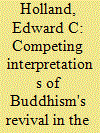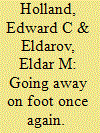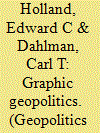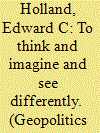|
|
|
Sort Order |
|
|
|
Items / Page
|
|
|
|
|
|
|
| Srl | Item |
| 1 |
ID:
140435


|
|
|
|
|
| Summary/Abstract |
This article uses a multiple methods framework to interrogate notions of religious revival among Buddhists in the Russian republic of Kalmykia. Survey results indicate high levels of self-identification among Kalmyks as Buddhists, as well as general support for the notion that the religion has re-established its place in the public sphere in the post-Soviet period. This straightforward interpretation of religious revival is contested, however, in interviews with religious elites and focus group conversations. Interlocutors in these forums were more critical and more nuanced in their understanding of Buddhism's role in contemporary Kalmykia.
|
|
|
|
|
|
|
|
|
|
|
|
|
|
|
|
| 2 |
ID:
116072


|
|
|
|
|
| Publication |
2012.
|
| Summary/Abstract |
This article addresses temporary labour migration - known in Russian as otkhodnichestvo (going away on foot) - from the Russian republic of Dagestan. The discussion is situated within reviews of current work on migration in the former Soviet Union, push-pull factors determining migration behaviour in the North Caucasus, and the historical importance of otkhodnichestvo in imperial Russia and the USSR. The paper then turns to the results of a census conducted in summer 2006, which found that most migrants come from Dagestan's mountainous southwest, frequently obtain work at locations characterized by economic growth and high pay, and rely on ethnic or communal networks as a basis for choosing employment sector and destination when searching for work.
|
|
|
|
|
|
|
|
|
|
|
|
|
|
|
|
| 3 |
ID:
153745


|
|
|
|
|
| Summary/Abstract |
Joe Sacco is best known for works that blend journalism with the format and structure of comic books. Sacco’s prior work has considered themes of political conflict, legacies of violence, and marginalization across a range of geographic contexts, including Bosnia, the Middle East, and the United States. This interview, conducted by the authors with Joe Sacco on 16 November 2015, explores these and other themes in an attempt to situate the positionality and choices of the creator of geopolitical narratives in the broader literature on critical geopolitics. We consider the themes of subject, representation, audience response, and stylistic influences, among others, in our conversation.
|
|
|
|
|
|
|
|
|
|
|
|
|
|
|
|
| 4 |
ID:
111642


|
|
|
|
|
| Publication |
2012.
|
| Summary/Abstract |
This paper, while acknowledging the import of popular geopolitics for understanding how foreign policies are interpreted in an everyday sense, argues that this literature has glossed over a set of key oppositional cultural formats, such as documentary films, satirical newspapers, and non-fiction comic books (referred to here as graphic narratives), which also influence the geopolitical imaginations of their consumers. Using Ó Tuathail's concept of the anti-geopolitical eye, the paper considers how popular geopolitical understandings are constructed, arguing that these oppositional formats, and graphic narratives in particular, challenge hegemonic scriptings of geopolitics through a bricolage of narrative techniques. Discussing the work of comics journalist Joe Sacco and his graphic narrative "Chechen War, Chechen Women" in detail, the paper considers how three distinct narrative techniques he employs - historical interlude, the singular panel, and the depiction of the banal - make possible a counter-hegemonic reading of the individual, localised consequences of the Chechen conflicts.
|
|
|
|
|
|
|
|
|
|
|
|
|
|
|
|
|
|
|
|
|